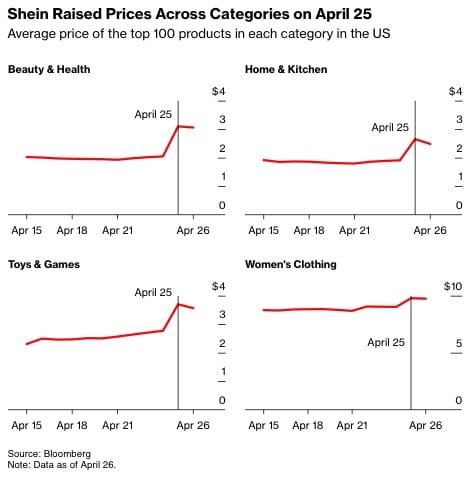April 28 2025
Ukraine peace talks; GOP tax package; Apple iPhone shift to India; Cheap e-comm hikes US prices; NM Gov deploys National Guard

Trump Administration Prepares to Walk Away from Ukraine Peace Talks as Russia Signals No Immediate Deal
GOP Pushes Trump’s “Big, Beautiful” Tax Package Amid Internal Fights over Spending and Deductions
Apple to Shift All US iPhone Assembly to India by 2026 Amid Trump’s Trade War
Cheap E-commerce Firms Raise US Prices Ahead of New Tariffs on Small Parcels
New Mexico Governor to Deploy National Guard in Albuquerque
GET THE CITIZEN JOURNAL APP - FREE!
1. Trump Administration Prepares to Walk Away from Ukraine Peace Talks as Russia Signals No Immediate Deal
Secretary of State Marco Rubio said Sunday that the Trump administration will decide this week whether to continue pursuing a negotiated settlement in Russia’s invasion of Ukraine or to turn its attention to other matters. In an interview on CBS News’s “Face the Nation,” Sergey V. Lavrov, the foreign minister of Russia, did not suggest any settlement was imminent. “We are ready to reach a deal,” he said. “But there are still some specific points — elements of this deal which need to be fine-tuned.” Russia launched a barrage of missiles and drones at Kyiv last Thursday that killed at least 12 people, prompting unusually sharp criticism from Mr. Trump. Mr. Lavrov said in the interview, which was recorded on the day of the strikes, that Russia still had not agreed to a U.S. proposal for a 30-day full cease-fire that the Ukrainians have said they accepted. Mr. Rubio’s remarks came a day after Mr. Trump met with President Volodymyr Zelensky of Ukraine in the halls of the Vatican while both leaders were attending the funeral of Pope Francis.
Source: NYT
2. GOP Pushes Trump’s “Big, Beautiful” Tax Package Amid Internal Fights over Spending and Deductions
WASHINGTON—Republicans pushed President Trump’s “big, beautiful” tax and spending package closer to the finish line with votes earlier this month approving a budget framework. But as lawmakers return to work this week, hard intraparty fights remain in writing and ironing out the multitrillion-dollar package. Most GOP lawmakers are on board with the broader plan to extend expiring pieces of the 2017 tax law, introduce new tax breaks such as “no tax on tips,” boost border spending and cut other government outlays. Speaker Mike Johnson (R., La.) wants to get the bill finished by Memorial Day. Still, fights are smoldering over the details, and several small groups of lawmakers have painted certain issues as nonnegotiable. Republicans are using a process called budget reconciliation that requires a simple majority in both chambers, which allows them to pass the package without Democratic votes. With the Senate split 53-47 and a House divided 220 to 213, any small group of Republican dissidents can block the broader GOP agenda. Here is a look at key groups that could throw up roadblocks.
Deficit hard-liners A group of so-called budget hawks have hinged their support of the president’s reconciliation bill on the idea that the tax cuts must be paired with significant spending cuts.
Medicaid defenders One area likely to be targeted in the pursuit of steep spending cuts is Medicaid, a health insurance program that covers more than 70 million people who are low-income and is a big part of state budgets and the healthcare economy. There is a bloc of Republicans warning that deep reductions in coverage will hurt constituents and make GOP efforts to keep the House majority more difficult in 2026.
SALT caucus A group of Republican lawmakers are vowing that their support for the Trump tax bill depends on raising the cap on state and local tax deductions, which was limited to $10,000 in 2017 as part of Trump’s tax law. Most of these lawmakers hail from states that have higher costs of living and property taxes, like New York, New Jersey and California.
Inflation Reduction Act protectors Republicans whose states and districts received billions in funding that went towards clean energy projects through the Biden administration’s Inflation Reduction Act are also warning party leaders against clawing back this funding and limiting tax credits that provide incentives. Such a clawback could be used to help offset the cost of other tax cuts, and Trump has repeatedly vowed to repeal the law.
Source: WSJ
3. Apple to Shift All US iPhone Assembly to India by 2026 Amid Trump’s Trade War
Apple plans to shift the assembly of all US-sold iPhones to India as soon as next year, according to people familiar with the matter, as President Donald Trump’s trade war forces the tech giant to pivot away from China. The push builds on Apple’s strategy to diversify its supply chain but goes further and faster than investors appreciate, with a goal to source from India the entirety of the more than 60mn iPhones sold annually in the US by the end of 2026. The target would mean doubling the iPhone output in India, after almost two decades in which Apple spent heavily in China to create a world-beating production line that powered its rise into a $3tn tech giant. China, where Apple manufactures the majority of its iPhones via third parties such as Foxconn, has been subject to the US president’s most aggressive levies, though he has since signalled a willingness to negotiate with Beijing. In the wake of Trump’s tariff announcements, which wiped $700bn from Apple’s market value, the company rushed to export available Indian-manufactured iPhones to the US to avoid the then-higher tariffs imposed on China. iPhone assembly is the last step in the production process, bringing together hundreds of components for which Apple is still heavily reliant on Chinese suppliers. Trump initially announced “reciprocal” tariffs of more than 100 per cent on imports from China, but then offered a temporary reprieve for smartphones. The devices are still subject to a separate 20 per cent rate that applies to all imports from China. India was hit with a so-called reciprocal tariff of 26 per cent, though this is paused while New Delhi pushes for a bilateral trade agreement with the US. On a visit to India this week, US vice-president JD Vance said the two countries were making “very good progress”. The US accounted for about 28 per cent of Apple’s 232.1mn global iPhone shipments in 2024, according to the International Data Corporation.
Source: FT
4. Cheap E-commerce Firms Raise US Prices Ahead of New Tariffs on Small Parcels
Fast-fashion giant Shein Group Ltd. raised US prices of its products from dresses to kitchenware ahead of imminent tariffs on small parcels, in an early sign of the potential effect of the trade war on American consumers. Most of the hikes in US prices came on Friday, with markups significantly higher in some categories than others, according to data compiled by Bloomberg News. The average price for the top 100 products in the beauty and health category increased by 51% from Thursday, with several of the items more than doubling in price. For home and kitchen products and toys, the average jump was more than 30%, led by a massive 377% increase in the price of a 10-piece set of kitchen towels. For women’s clothing the rise was 8%. E-commerce shopping platforms like Shein and Temu face a 120% tariff on many of their products due to the US government’s decision to end the “de minimis” exemption for small packages from mainland China and Hong Kong. Exporters in recent years had capitalized on the exemption, which allowed goods valued at under $800 to enter the US without tariffs or customs duties. In general, prices rose by about 10% for Shein in the US from April 24 to 26 based on a sample shopping cart filled by Bloomberg News with 50 items from a range of categories. During the period, 7 out of 50 sampled items were delisted in the US. In contrast, Shein’s prices in the UK stayed mostly unchanged and no items were delisted.

Source: Bloomberg
5. New Mexico Governor to Deploy National Guard in Albuquerque
To critics, President Trump’s threat to deploy the military to fight crime and unrest in America’s cities is a nightmare scenario, a pretext for martial law and a potential assault on democracy. But starting next month, dozens of National Guard troops will be on the streets of a deeply Democratic city, Albuquerque, in a deeply Democratic state, New Mexico. And they are being deployed by the state’s governor, Michelle Lujan Grisham, a Democrat. She said they are needed to help the strained police force confront a crisis of violent crime and fentanyl use.
Source: NYT
April 28, 2004: U.S. media release graphic photos of American soldiers abusing Iraqi prisoners at Abu Ghraib
On April 28, 2004, the CBS program 60 Minutes reports on abuse of prisoners by American military forces at Abu Ghraib, a prison in Iraq. The report, which featured graphic photographs showing U.S. military personnel torturing and abusing prisoners, shocked the American public and greatly tarnished the Bush Administration and its war in Iraq.
SUBSCRIBE ONLINE TO GET THE US CITIZEN JOURNAL IN YOUR INBOX - FREE!
See the Ad Astra Podcast! Released on Apple and Spotify around 10a CST.
Sponsors (click me!)





Sources
- https://www.nytimes.com/2025/04/27/us/politics/trump-ukraine-rubio-zelensky-putin.html
- https://www.wsj.com/politics/policy/republican-trump-tax-bill-gop-votes-7ffc2581?mod=hp_lead_pos10
- https://on.ft.com/3YHHlgr
- https://www.bloomberg.com/news/articles/2025-04-27/shein-hikes-us-prices-as-much-as-377-ahead-of-tariff-increases
- https://www.nytimes.com/2025/04/28/us/albuquerque-national-guard.html
